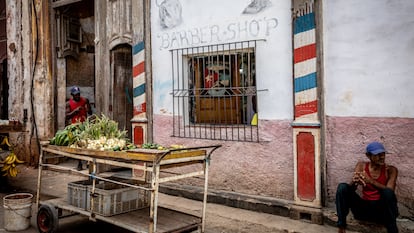The government of Cuba declares itself in a ‘war-time economy’
The Díaz-Canel executive approves a series of measures that include budget cuts, equal pricing policy and readjustments aimed at ‘correcting distortions’

Cuban authorities, no longer able to disguise the situation, have assumed that the island is immersed in what amounts to “a war-time economy.” In the midst of a crisis that has surpassed the so-called Special Period of the 1990s, the government of Miguel Díaz-Canel is now resorting to a new package of measures to promote macroeconomic stability, with changes that include budget cuts, equal pricing policy, regulations and readjustments aimed at “correcting distortions and re-boosting the economy during 2024.”
At a recent meeting of the Council of Ministers, Mildrey Granadillo de la Torre, First Deputy Minister of Economy and Planning, said that the measures seek to adjust the 2024 Plan and Budget to the conditions of a “war-time economy,” a term that is often used in extreme situations, and which the authorities now apply to a country that ended 2023 with an inflation of 30%, an economy contracted by 2% and a depreciation of the Cuban currency of more than 50% against the dollar and the euro in the informal market.
After making an analysis in X, the Cuban economist Pedro Monreal said that using the term “war-time economy” would justify greater control by the authorities. According to him, the term is being used to justify total control because now “is when we need to plan the most and this is when we most need to exercise control.”
The measures, published in the official newspaper Granma, include a reduction “in the Budget items with the objective of reducing the fiscal deficit in 2024.” The government also said it would centralize decision-making on the national budget.
The Cuban government will also establish equal pricing policy that is “inclusive and on equal terms for all subjects of the economy,” which includes both state and non-state sectors. In different media outlets it has emerged that products such as chicken, oil, sausage, powdered milk, pasta and detergent will have capped sales prices, an issue that would alleviate the discontent that many Cubans feel with the high and changing prices of these products in the private sector.
Monreal indicated that “the most striking thing” among the new measures — no date has been set for their implementation — is the intention to “postpone and even paralyze investments that are not essential.” He also emphasized that “without investment there is no growth or development, and until now the essential investments have been those in tourism. Will they continue?”
President Miguel Díaz-Canel said at the meeting that the country is going through “economic complexities” that affect the timely delivery of food rations that each Cuban household receives through the so-called supply book; citizens are also dealing with constant blackouts lasting several hours throughout the island, and rampant inflation that limits families’ access to basic necessities. The president insisted that the causes of this situation are often “directly related to the bureaucracy and the inefficient control that we are carrying out from our institutional system.”
Sign up for our weekly newsletter to get more English-language news coverage from EL PAÍS USA Edition
Tu suscripción se está usando en otro dispositivo
¿Quieres añadir otro usuario a tu suscripción?
Si continúas leyendo en este dispositivo, no se podrá leer en el otro.
FlechaTu suscripción se está usando en otro dispositivo y solo puedes acceder a EL PAÍS desde un dispositivo a la vez.
Si quieres compartir tu cuenta, cambia tu suscripción a la modalidad Premium, así podrás añadir otro usuario. Cada uno accederá con su propia cuenta de email, lo que os permitirá personalizar vuestra experiencia en EL PAÍS.
¿Tienes una suscripción de empresa? Accede aquí para contratar más cuentas.
En el caso de no saber quién está usando tu cuenta, te recomendamos cambiar tu contraseña aquí.
Si decides continuar compartiendo tu cuenta, este mensaje se mostrará en tu dispositivo y en el de la otra persona que está usando tu cuenta de forma indefinida, afectando a tu experiencia de lectura. Puedes consultar aquí los términos y condiciones de la suscripción digital.









































